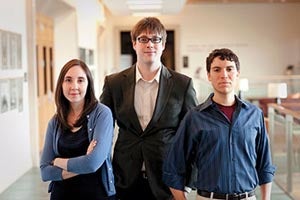Students devise an appeals process for the new consumer watchdog agency
Last year, after Rory Van Loo ’07 left the Consumer Financial Protection Bureau implementation team to become assistant director of the Harvard Negotiation & Mediation Clinical Program, he asked his former colleagues how HLS students might assist the new agency. It had been created by Congress in 2010 largely thanks to the vision of HLS Professor Elizabeth Warren, and its mission included examining certain consumer financial services companies and large banks and credit unions. But the legislation creating it did not establish an appeals process for examining findings.
Creating that process became a project for three students in the Harvard Negotiation and Mediation Clinic. In December they flew to Washington, D.C., to meet with officials at the agency, including current Director Richard Cordray, to present their vision for such an appeals system.
Under the leadership of HLS Clinical Professor Robert Bordone ’97, director of the clinic, the team—Ryan Blodgett ’12, Elizabeth Grosso ’13 and Jeff Monhait ’12—had spent hundreds of hours during the fall semester interviewing officials at the new consumer bureau and other federal and state agencies, researching best practices in this area, and determining how to structure a system that would have legitimacy in the eyes of all the stakeholders.
“We spent a lot of time thinking about how to balance the system so that it was not one that just the agency would be happy with,” says Blodgett.
The presentations and accompanying white paper serve as resources as the bureau staff determines whether it will establish an appeals process. Mira Marshall, program manager of large bank supervision policy at the agency, says it was particularly important to have the students “provide an independent, unbiased approach to researching a topic about which there were a variety of viewpoints within the bureau.”
For Bordone—whose clinic won the 2010 Problem Solving in the Law School Curriculum award from the International Institute for Conflict Prevention & Resolution—it was an ideal project for his students.
“An appeals process is essentially a dispute resolution system,” he says. “Most of the time, we are coming into an organization that already has some kind of a dispute resolution system in place and we are modifying or redesigning it, but this gave us the rare chance to start from a clean slate.”
Creating something from scratch also appealed to the students. “In law school, it seems we are always evaluating and thinking about making incremental changes in entrenched processes,” says Grosso. “That we could think, from the ground up, about what the best process would be was really cool.”
